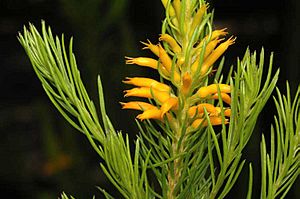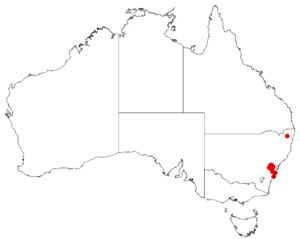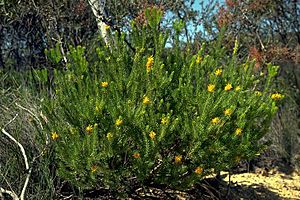Needle geebung facts for kids
Quick facts for kids Needle geebung |
|
|---|---|
 |
|
| Persoonia acerosa growing in the ANBG | |
| Conservation status | |
| Scientific classification | |
| Genus: |
Persoonia
|
| Species: |
acerosa
|
 |
|
| Where the Needle Geebung is found (data from AVH) | |
The Needle Geebung (Persoonia acerosa) is a special flowering plant. It belongs to the Proteaceae family. This plant only grows in a small part of New South Wales, Australia. It is a shrub with tiny, needle-like leaves. It also has bright yellow flowers and yellowish-green fruit shaped like a small pear.
Contents
What the Needle Geebung Looks Like
The Needle Geebung is a shrub that can grow from about 0.5 to 2 meters tall. Its bark is smooth. The leaves are thin and look like needles. They are about 10 to 23 millimeters long and very narrow. The top of each leaf has a small groove.
Flowers and Fruit
The flowers grow among the leaves on a branch. This branch keeps growing even after the flowers appear. Each flower sits on a tiny stalk, about 1 to 2 millimeters long. The flowers are shaped like a tube and are 8 to 10 millimeters long. They are smooth and usually bloom in summer.
After the flowers, the plant produces fruit. This fruit is yellowish-green and shaped like a pear. It can grow up to 14 millimeters long. This type of fruit is called a drupe.
How the Needle Geebung Got Its Name
The Needle Geebung was first officially described in 1827. Two scientists, Josef August and Julius Hermann Schultes, wrote about it. They used notes from another scientist, Franz Sieber, who had not yet published his findings.
Where the Needle Geebung Lives
The Needle Geebung grows in different types of natural areas. You can find it in open heathlands, scrubby woodlands, and forests. It prefers sandy soil found on sandstone rocks.
Specific Locations
This plant lives on the Central Coast of New South Wales. It also grows in the central Blue Mountains area. You can find it up to the Hill Top district. It usually grows at heights between 550 and 1000 meters above sea level. Most Needle Geebungs are found in the upper Blue Mountains. Sadly, it is thought to be gone from the Hill Top area.
Why the Needle Geebung Needs Protection
The Needle Geebung is listed as "vulnerable." This means it is at risk of becoming extinct. Both the Australian Government and the New South Wales Government protect it. They do this under special laws.
Threats to the Plant
Several things threaten the Needle Geebung:
- Land clearing: People removing its habitat for buildings or farms.
- Bushfires: Fires set to reduce bushfire risks can harm the plants.
- Weeds: Invasive plants can take over its growing areas.
- Human disturbance: Vehicles driving off-road and people dumping rubbish can damage the plants and their environment.



